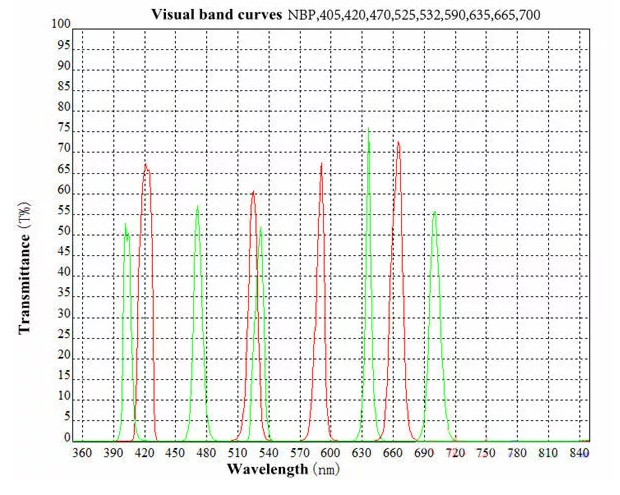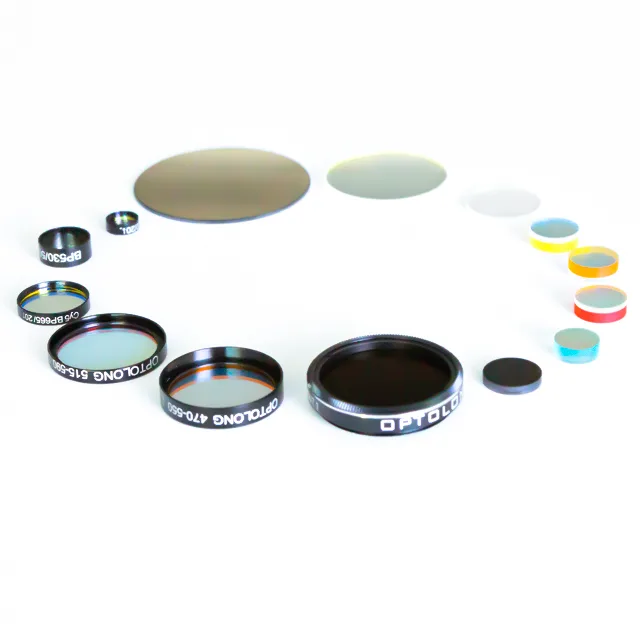Introduction
In order to let one range of light wavelengths through while obstructing others, an optical band pass filter is a useful tool used in optics and photography. Only the desired colors or wavelengths are able to pass through these filters and reach the camera sensor or detector, acting as somewhat of a gatekeeper for light.
Imagine you’re at a concert, and you only want to hear the guitar and not the drums or vocals. An optical band pass filter works similarly by isolating a specific portion of the light spectrum, such as a particular color or range of colors. This selective filtering can be incredibly useful in various applications.
In photography, it helps enhance certain colors or reduce unwanted glare. In scientific research, it aids in analyzing specific wavelengths of light for experiments. In telecommunications, it ensures that only the intended signals pass through optical fibers, minimizing interference.
Optical Band Pass Filter: What is It?
An Optical Band pass filters is like sunglasses for light. It lets certain colors of light pass through while blocking others. It’s like a traffic cop for light waves.
This filter consists of special materials that only allow a specific range of wavelengths to go through. For example, if you want to see only blue light, you’d use a blue band pass filters .
These filters are super useful in various applications. In photography, they enhance specific colors in photos. In scientific experiments, they isolate desired wavelengths for accurate measurements.

Why Optical Band Pass Filter are important?
Optical Band Pass Filters are incredibly important for a variety of reasons. These filters serve as indispensable tools in various fields due to their ability to selectively control the transmission of light. Let’s look into why they are so crucial:
Enhancing Imaging Quality: In photography and videography, optical band pass filters help improve image quality by allowing only specific colors or wavelengths to pass through the lens. This ensures that the captured images have the desired colors and contrast.
Scientific Research: Scientists rely on band pass filters to isolate and study specific wavelengths of light. This is vital for tasks such as spectroscopy, fluorescence microscopy, and environmental monitoring, where precise measurements are essential.
Medical Diagnostics: Band pass filters are used in medical instruments like spectrophotometers to analyze blood samples and detect diseases based on the absorption of specific wavelengths. They play a critical role in early disease diagnosis and monitoring.
Communication Systems: In telecommunications, optical band pass filters help ensure the accuracy and efficiency of optical signals. They filter out unwanted noise and allow only the desired wavelengths to transmit data effectively.
Astronomy and Space Exploration: Astronomers use band pass filters to study celestial objects and phenomena. These filters help block out unwanted light, such as light pollution and allow astronomers to observe specific wavelengths emitted by distant stars, galaxies, and nebulae.
Environmental Monitoring: Environmental scientists utilize band pass filters to measure and analyze the composition of air and water. They can detect pollutants and assess the health of ecosystems by focusing on particular wavelengths associated with specific substances.
Security and Surveillance: In security cameras and surveillance systems, optical band pass filters to aid in night vision and image enhancement. They filter out unwanted ambient light, allowing infrared or other critical wavelengths to provide clear images in low-light conditions.
Art and Entertainment: In the world of entertainment, stage lighting designers use band pass filters to create dramatic and colorful lighting effects during concerts, theatrical performances, and events. These filters help set the mood and atmosphere.
Remote Sensing: In remote sensing applications, such as satellite imaging and aerial photography, band pass filters are used to capture detailed information about the Earth’s surface. They enable the detection of specific features, like vegetation health or soil composition.
Consumer Electronics: Optical band pass filters are present in everyday devices like digital cameras and smartphones. They ensure that the images and videos we capture are vibrant and true to life by filtering out unwanted light.
Applications of Optical Band Pass Filters
Optical Band Pass Filters serve a multitude of practical purposes across various fields, making them indispensable in many applications. Let’s explore some of these diverse uses:
Photography and Imaging: Band pass filters enhance image quality by isolating specific colors or wavelengths, ensuring vivid and sharp pictures.
Scientific Research: Scientists employ these filters for precise measurements in spectroscopy, microscopy, and environmental monitoring, isolating desired wavelengths.
Medical Diagnostics: In medical instruments like spectrophotometers, band pass filters help detect diseases by analyzing blood samples based on specific wavelength absorption.
Telecommunications: Band Pass Filters are vital in ensuring accurate data transmission by eliminating unwanted noise and focusing on the desired wavelengths.
Astronomy and Space Exploration: Astronomers use these filters to observe celestial objects, blocking light pollution and allowing the study of specific wavelengths emitted by stars, galaxies, and nebulae.
Environmental Monitoring: Environmental scientists rely on band pass filters to assess air and water composition, detect pollutants, and evaluate ecosystem health.
Security and Surveillance: In security cameras, these filters enable night vision and image enhancement, providing clear visuals even in low-light conditions.
Entertainment Lighting: Band pass filters are used by stage designers to create dramatic lighting effects during musical and theatrical performances that help create the right mood and ambience.
Remote Sensing: Band pass filters discover aspects like plant health and soil composition in applications like satellite photography by gathering precise information about the Earth’s surface.
Consumer Electronics: Devices like digital cameras and smartphones depend on band pass filters to provide lifelike photos by removing unnecessary light.

FAQs
What is an Optical Band Pass Filter?
It’s a device that allows specific colors or wavelengths of light to pass through while blocking others.
How do Optical Band Pass Filters work?
They use special materials to selectively transmit the desired range of light wavelengths.
